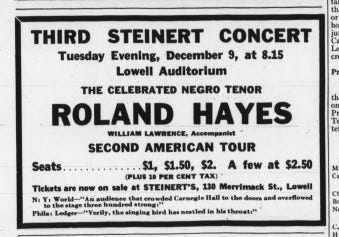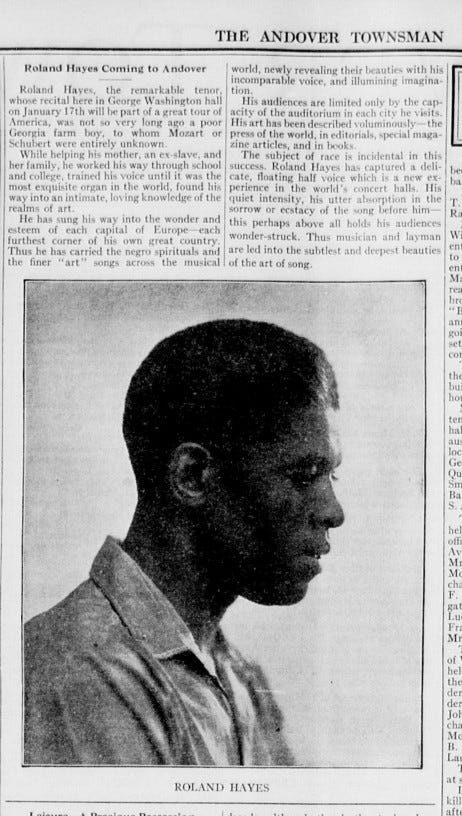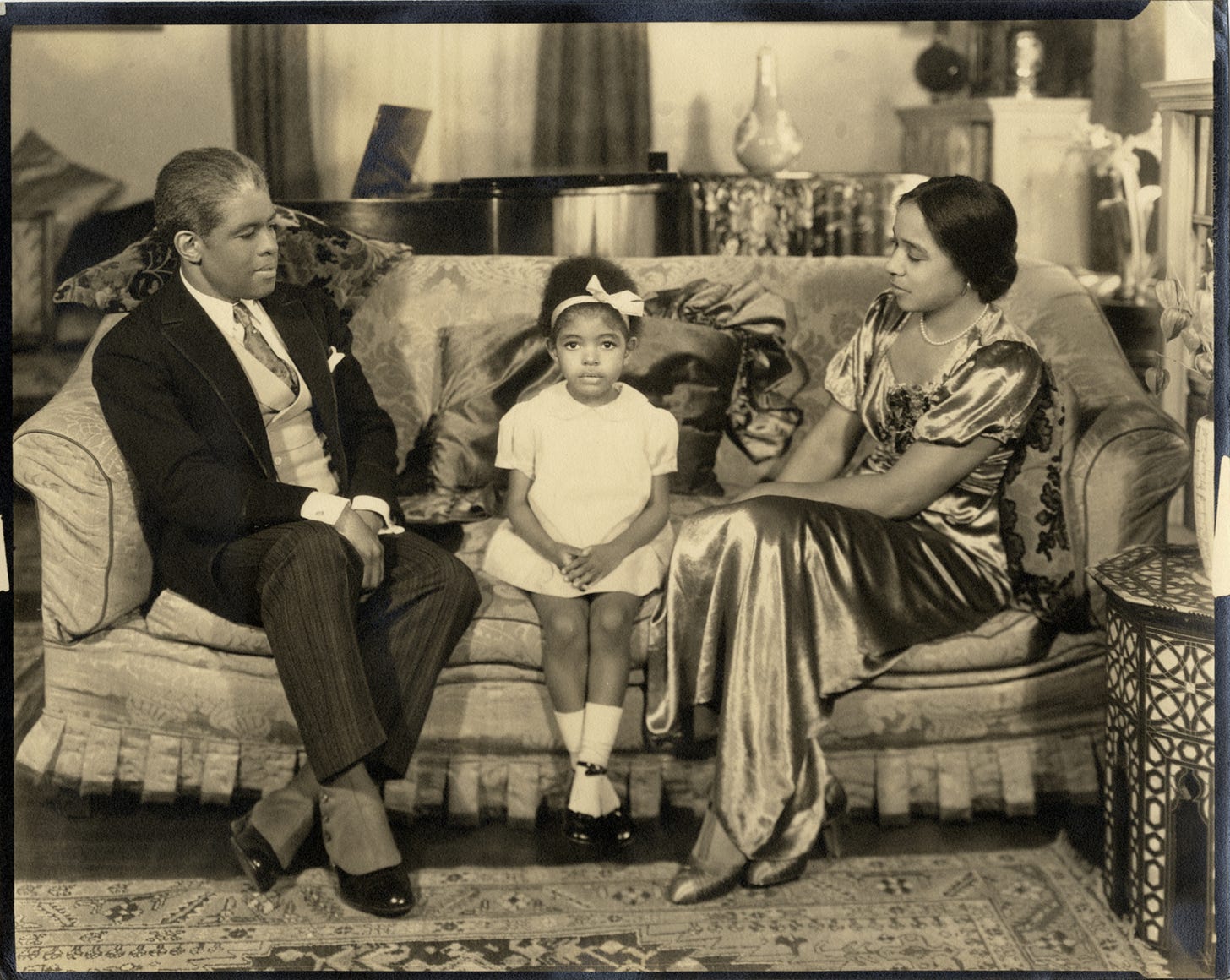Miscellany Mondays: Tenor Roland Hayes - a star comes to Andover
The first African American to achieve fame as a concert performer both in the United States and abroad, Roland Hayes performed two concerts in Andover in the 1930s.
Tenor Roland Hayes (1887-1977) was the first African American to achieve fame as a concert performer both at home in the United States and abroad. Hayes performed two concerts in George Washington Hall on the Phillips Academy Andover campus on January 7, 1930 and November 9, 1934.
Roland Hayes1 was born in Curryville, Georgia, in 1887 to Fanny and William Hayes, both of whom had been born into slavery.2 Fanny and William had seven children, including son Roland. The Hayes family were tenant farmers on a plantation farm.
William Hayes died in 1898, when Roland was 11 years old. His early education ended in the fifth grade. Fanny moved the family to Chattanooga, Tennessee, and Roland Hayes went to work in an iron foundry, “where he was badly injured when a conveyor belt pulled him into the machinery.”3
Hayes sang in the church choir and later formed a group called the Silver-Toned Quartet.4 His voice caught the attention of the choral director Arthur Calhoun, who introduced Hayes to recordings of the famed opera singer Enrico Caruso.
Inspired to pursue a career in music, Hayes worked to catch up on years of lost education and entered Fisk University, in Nashville, TN.5 There he joined the famous Fisk Jubilee Singers.6
On a Jubilee Singers concert tour in 1911, Hayes decided to leave Fisk University and settle in Boston, MA, where he found work as a messenger at the Hancock Life Insurance Company.7 Over the next few years, Hayes continued his vocal training and formed a trio with two other musicians. The group achieved some success, but Hayes wanted more.
Between 1916 and 1919, Hayes arranged his own concerts, recitals, and tours. In April 1920, he moved to London where he studied with Sir George Henschel. Hayes was so successful and acclaimed that he was invited to perform for King George V and Queen Mary.
Hayes also traveled throughout Europe where he was not always well-received. In Germany, Hayes recalled,
Well, I came out on stage, and there was a burst of hissing that lasted about ten minutes. I just stood there, and then I decided to change my program. As soon as it was quiet, I began with Schubert’s “Du bist die Ruh” (“You are rest and peace”). I could see a change come over the hostile faces, and by the end of the song I knew I had won.8
It was tantamount to rebuking the Germans in their own language.9
Roland Hayes returned to the United States in 1923 to perform in Boston. After being snubbed just a few years earlier, Hayes was able to secure professional management with the Boston Symphony Orchestra.10
In 1924, Hayes performed at the Lowell Auditorium in Lowell, MA.
Hayes performed a combination of European classical music and American Negro Spirituals, which he called “American Folk Music.”11 He dedicated spirituals to his mother, Fanny Hayes, whom he called “Angel Mo.” He wrote in his biography,12
“I wonder how well aware people are of the serious intent and purpose to which these songs were given by the religious leaders of my forebears; and the necessity of their intelligent, inspired, leadership suited to the heart and soul needs of my people at the time of the Emancipation Proclamation?”
The 1920s were very successful for Hayes. By 1924, he was earning $100,000 a year, at a time when the average annual income was $750.13
Hayes purchased the 600-acre farm in Georgia where his mother had been enslaved. His ambition was that the farm would be a model for local farmers for self-sufficiency. His plan included not only jobs, but education for children as well.14
He purchased a home outside Paris. And he bought a home at 58 Allerton Street in Brookline, MA, where he would live until his death in 1977.
In the 1930s, the Great Depression hit Hayes hard. The Paris home was sold and he was once again without professional management. So he returned to arranging his own concerts and tours.15
Roland Hayes’ first Andover concert, January 17, 1930, was much-anticipated and reported on frequently in the Andover Townsman newspaper in the months leading up to his concert. From the December 13, 1929 paper,
In September 1932, Roland married his cousin Helen Mann. Their daughter Afrika Hayes was born in 1933. A talented musician and singer, Afrika Hayes Lambe still teaches at the Walnut Hill School for the Arts in Natick, MA.
Roland Hayes returned to Andover in November 1934.
An incident occurred in Georgia in 1942 when Hayes’ wife Helen and daughter Afrika sat in a shoe store front in “whites-only” seats. After being confronted, Helen Hayes refused to move and was arrested. Roland Hayes was later arrested and beaten. Local police denied the assault. Newspapers across the country, including the Boston Globe, ran stories about the assault, condemning the brutality of the family’s treatment.
Following the arrest, Hayes sold the Georgia farm, “The collapse of the farm project was the bitterest disappointment of Hayes’ life.”16
Roland Hayes’ later years
The autumnal years have had compensations, however. The Hayeses’ daughter, Afrika, has grown up, is married, and has a child. Father and daughter have sung joint recitals in Boston. Honorary degrees – more than he can remember without looking them up – have been conferred upon him. His scholarship in music continues to provide him – and audiences – with the delights of discovery. Serious young scholars in Boston and elsewhere warm to him. 17
Hayes’ 80th birthday party was held at the Gardner Museum in Boston. In addition to teaching at Boston University, Hayes continued to perform. His final performance was at the Longy School of Music in Cambridge, MA, in 1973. Hayes has a number of schools named after him, including the Roland Hayes School of Music, Boston Public Schools, and and the Roland Hayes Junior High School in Brooklyn, NY.
Roland Hayes inspired, mentored, and promoted many singers who went on to critical and popular success including Marian Anderson, Paul Robeson, Leontyne Price, Dorothy Maynor, Edward Boatner, and William Warfield. Hayes taught at Boston College and Ohio University and received numerous awards including the Spingarn medal from the National Association for the Advancement of Colored People.18
Roland Hayes died in 1977 and is buried in Mount Hope Cemetery, Boston.

Thank you for reading! This article was a such pleasure to research and write. I hope you enjoy these recordings of Roland Hayes. The first “Du Bist Die Ruh” — “You are rest and peace” — was the song Hayes sang in Germany in 1920. The second, “Lit’l Boy,” is one of the many spirituals Hayes sang.
Roland Hayes believed, “unshakably in universality - ‘What we have in us is also part of somebody else . . . why else did the French and English respond to my people's songs?’19
~Elaine
Photo portrait, https://news.wsu.edu/news/2021/06/24/roland-hayes
http://afrovoices.com/roland-hayes-biography/
IBID
IBID
Fisk University, https://www.fisk.edu/about/history In 1865, barely six months after the end of the Civil War and just two years after the Emancipation Proclamation, three men — John Ogden, the Reverend Erastus Milo Cravath, and the Reverend Edward P. Smith — established the Fisk School in Nashville. The school was named in honor of General Clinton B. Fisk of the Tennessee Freedmen's Bureau, who provided the new institution with facilities in former Union Army barracks near the present site of Nashville's Union Station. In these facilities Fisk convened its first classes on January 9, 1866. The first students ranged in age from seven to seventy, but shared common experiences of slavery and poverty — and an extraordinary thirst for learning.
Fisk University Jubilee Singers, http://fiskjubileesingers.org/about-the-singers/our-history
Bach Cantatas, https://www.bach-cantatas.com/Bio/Hayes-Roland.htm
The Black Perspective in Music, Autumn, 1974, Vol. 2, No. 2, pp. 179-185, https://www.jstor.org/stable/1214234
IBID
Bach Cantatas, https://www.bach-cantatas.com/Bio/Hayes-Roland.htm
Three Mo’ Tenors, https://threemotenors.com/roland-hayes/
http://afrovoices.com/roland-hayes-biography/
Three Mo’ Tenors, https://threemotenors.com/roland-hayes/
The Black Perspective in Music, Autumn, 1974, Vol. 2, No. 2, pp. 179-185, https://www.jstor.org/stable/1214234
IBID
IBID
Three Mo’ Tenors, https://threemotenors.com/roland-hayes/
he Black Perspective in Music, Autumn, 1974, Vol. 2, No. 2, pp. 179-185, https://www.jstor.org/stable/1214234
IBID














